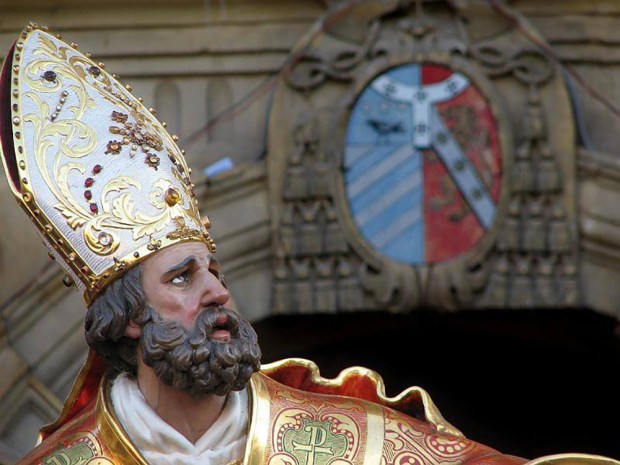Lenten Campaign 2025
This content is free of charge, as are all our articles.
Support us with a donation that is tax-deductible and enable us to continue to reach millions of readers.
One of the most famous chapters of the Rule of Saint Benedict is Chapter 53. It carefully describes how monks must tend to the needs of visitors and pilgrims staying in the monastery. The text is relatively brief but, in spite of its brevity, is by far the most famous and influential part of the Rule. Inspired by Scripture, it summarizes the thousand-years-long tradition of Biblical hospitality in just a few lines. It reads as follows:
It is not surprising that monastic communities take hospitality to be at the very core of their mission and identity. Monasteries are more often than not found in relatively inaccessible, secluded, lonely areas. Travelers wandering around these particularly remote regions could surely use all the help they could get —especially from monks, compelled by their Rule and commonsensical Christian charity to lend a helping hand. The passage from the Gospel of Matthew inspiring the Benedictine rule reads:
Clearly, hospitality is not a monastic invention but rather a core biblical value. The Gospels describe Jesus as having “no place to read his head” from the very beginning. Common, traditional narratives regarding the Nativity present Mary and Joseph as being turned away by every innkeeper. Some events in the book of Acts also mirror the great hospitable gestures of the Patriarchs. Jesus himself is portrayed in the Gospels as constantly traveling throughout Galilee, almost like an itinerant preacher, thus in constant need of shelter and hospitality.
Genesis 18 is the key text where the model of biblical hospitality is found. It has been read as the paradigmatic human response to the original divine hospitality. Just like in the initial lines of the same book God creates a world fit for human beings and provides them with everything they might need during their stay in it, chapter 18 flips the coin. It tells the story of Abraham and Sarah’s generous hospitality to three visitors who came to them by the oaks of Mamre. Seminomadic life would often bring people from different origins into contact with one another. Abraham’s Canaan was part of natural land bridge between Asia and Africa —a popular trade route. In the absence of a formal industry of hospitality, people had the obligation to welcome strangers.
The text reads:
A very simple, straightforward fact has been considered to be the core lesson found in this passage: were it not for their hospitality, Abraham and Sarah would have never had any children. It is precisely because they receive these strangers in their house that they also receive the blessing of having Isaac. Abraham and Sarah, in their own human scale, reciprocated God’s initial, divine, “cosmic” hospitable gesture.
Another celebrated biblical traveler, Saint Paul, brought a similar gift elsewhere.
“Of all the gifts brought to these shores in the course of your people’s history”, Pope Benedict XVI told the Maltese when he visited the country in 2010, “the gift brought by Paul was the greatest of all, and it is much to your credit that it was immediately accepted and treasured.” Benedict was referring to the famous passage in the book of Acts commonly referred to as Paul’s Shipwreck, and his meeting with Publius, the chief of the island who eventually became its first bishop:
Luke was Paul’s companion and scribe during his trips around the Mediterranean. On his way to trial in Rome in the year 60, Paul was shipwrecked off the northwestern coast of Malta and spent the unnavigable winter months there. As seen in the text, during his stay he converted the island’s governor, Publius, healed the sick, and preached the Gospel, establishing the very roots of Maltese Christianity.
Since then —and to this day— the Maltese are among the most passionate Catholics in the world, with an uninterrupted two-millennia long tradition of rich Christian heritage. Starting with Publius, the Maltese Christian community is as ancient as those of Ephesus, Jerusalem, Corinth, and Rome, thanks not only to Paul’s providential shipwreck, but to the hospitality the Maltese provided him with.
In one of his homilies, John Chrysostom explains it was quite exceptional that a man like Publius —noble, rich, in a prominent leadership position— would also be kind enough to display such a charitable disposition towards Paul and the other prisoners, even allowing him to freely preach the Gospel in the island. Tradition maintains that during his three-month stay there, Paul converted Publius to Christianity and ordained him as Bishop of Malta, in charge of tending to the newly established Christian community —abundant Paleo-Christian archaeological remains are witness to this millenary tradition, the Grotto of St Paul and St Agatha and St Paul’s catacombs in particular. In fact, this grotto is believed to have been the place where the Apostle spent most of his time preaching the Gospel.
Years later, Publius was sent to Athens, and became its second bishop, succeeding Saint Dionysius the Areopagite —a character also featured in the book of Acts. He was later martyred there, around the year 112, during the reign of Emperor Hadrian, being thrown to the lions. He was succeeded as bishop by St Quadratus.
Make sure to visit the slideshow below to discover the Maltese Paleo-Christian catacombs, the most important of its kind outside of Rome.







